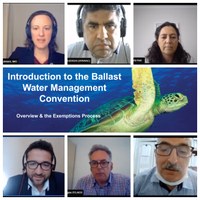Addressing ballast water management and invasive species in the Mediterranean region – Sep 25, 2020
In keeping with the theme of World Maritime Day for 2020: "Sustainable shipping for a sustainable planet", some 69 participants, from various ministries, departments, agencies and other stakeholders, took part in a virtual webinar (23 September) to raise awareness, enhance knowledge and share best practices on implementation of the International Convention for the Control and Management of Ships' Ballast Water and Sediments (Ballast Water Management (BWM) Convention), and its application in the Mediterranean region, amid the global pandemic.
The webinar, the first to be organized online by the Regional Marine Pollution Emergency Response Centre for the Mediterranean Sea (REMPEC), gave an overview of the BWM Convention and updated participants on revisions to the Mediterranean BWM Strategy with respect to changes in international regulations, since entry into force of the BWM Convention in 2017. Knowledge was shared on the preparation of a Mediterranean Strategy for the Prevention and Response to Marine Pollution from Ships (2022-2031), and a review of the guidance related to the common indicator on non-indigenous species of the Integrated Monitoring and Assessment Programme and related assessment criteria for the Mediterranean Sea and Coast (IMAP).
According to a recent REMPEC Study, vessel-introduced non-indigenous species have been estimated to account for 26% of all species introduced in the Mediterranean. In the last ten years, the number of taxa in the Mediterranean Sea has continued to increase, posing a significant threat to humans in terms of health and recreational activities as well as environments and indigenous species in the region.
The need for a unified approach to address problems of ballast water and invasive species in the Mediterranean region was echoed in presentations delivered by the International Maritime Organization, the Baltic Marine Environment Protection Commission, the Specially Protected Areas Regional Activity Centre (SPA/RAC), and the ODYSSEA Project, as well as representatives from the 16 Contracting Parties to the Barcelona Convention.
Watch the full webinar here.


